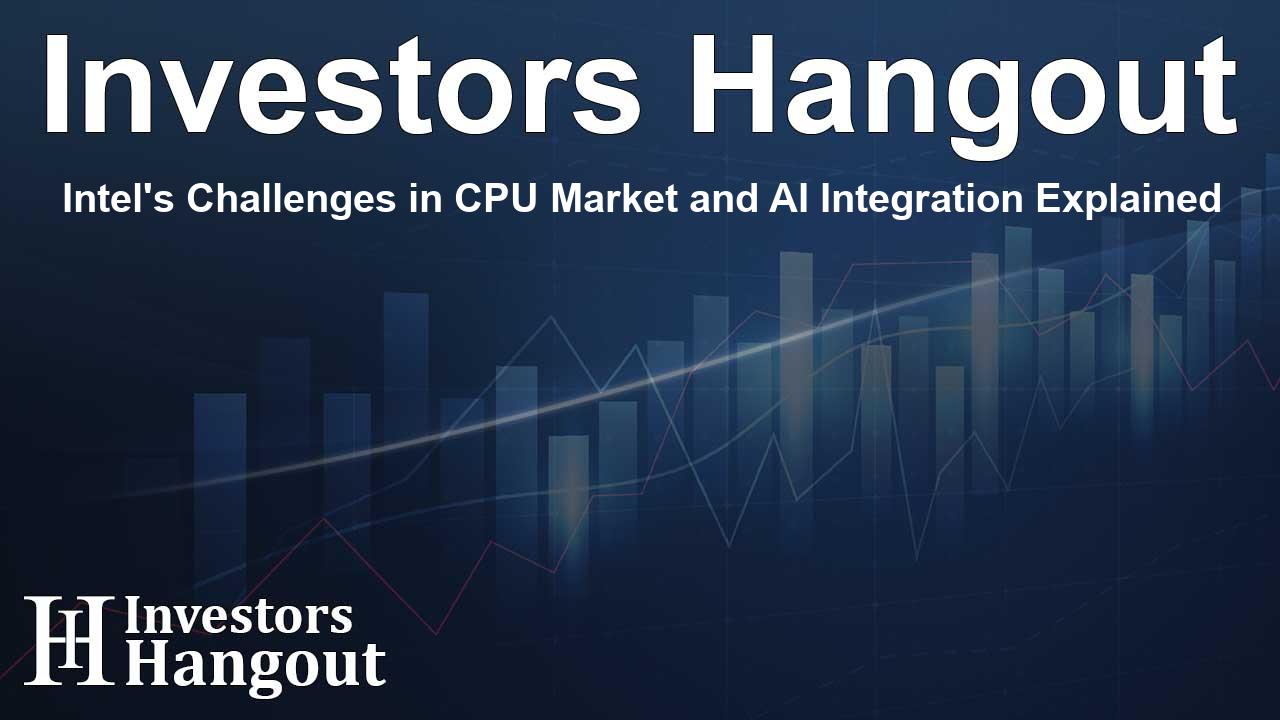Intel's Challenges in CPU Market and AI Integration Explained

Intel's Struggles in the CPU Market
Intel (NASDAQ: INTC) is currently facing significant hurdles in maintaining its competitive edge, particularly in the central processing unit (CPU) sector and the burgeoning artificial intelligence (AI) market. Despite being a major player for years, Intel has seen its market share erode, particularly to competitors like Advanced Micro Devices (AMD) and Arm Holdings (ARM). This downturn is notable in both the personal computer and server markets, as Intel grapples with limited AI integration and partnerships, including one with Nvidia (NASDAQ: NVDA).
Analyst Insights on Intel
The technology sector analyst from Bank of America Securities, Vivek Arya, has revised Intel's rating to Underperform from Neutral, citing ongoing concerns. His price forecast for Intel's shares is set at $34, suggesting a reflection of the chipmaker's precarious position in the current market.
Financial Health Versus Competitive Challenges
Despite the challenges, Arya noted that Intel boasts a robust balance sheet. However, these financial strengths do not overshadow the competitive pressures Intel faces in its positioning and strategy concerning AI integration.
Market Cap Increase and Its Implications
Interestingly, Intel's recent increase in market capitalization to $80 billion is attributed more to its improved finances and potential foundry services than its actual product advancements. Arya expressed skepticism regarding Intel's capability to maintain this momentum moving forward, particularly as it lacks an extensive AI product portfolio.
Future Growth and Revenue Needs
Arya highlighted that Intel's current share price of around $37 hints at optimistic performance predictions that require substantial revenue growth—approximately $10 billion extra by 2027. This would have to come from either their CPU offerings or new external client acquisitions in a very dynamic marketplace.
The Foundry Dilemma
Further complicating matters, Arya criticized valuation tactics that segregate Intel Foundry from the overall company strategy. He pointed out that Intel's foundry segment cannot thrive independently and heavily depends on the internal client base of Intel Products. Even potential external revenues from foundry services might not become profitable until calendar 2027.
Dependency on Taiwan Semiconductor
Intel is also reliant on Taiwan Semiconductor Manufacturing (NYSE: TSM) for about 30% of its manufacturing processes. There are ongoing uncertainties regarding upcoming production technologies, further adding strain to Intel's operational capabilities.
Potential Upsides Despite Challenges
While there are clear hurdles in the way, Intel still retains several potential catalysts for growth. Expected opportunities include up to $20 billion in capital from partnerships and government initiatives. Notably, collaborations with Nvidia may strengthen its AI positioning, although the absence of an established AI accelerator product poses a limitation.
CPU Market Competition Dynamics
In terms of market dynamics, Intel continues to face stiff competition in the CPU arena, particularly from AMD and Arm in both PC and server segments. Notably, advancements such as Lunar Lake and Arrow Lake CPUs are geared toward reinstating competitiveness in the laptop market; however, the high-end desktop sector remains vulnerable.
Future Product Roadmap
Looking ahead, Arya noted that the introduction of Panther Lake (18A) laptops by late 2025 signifies progress for Intel's product lines and future offerings. Desktop improvements must remain a priority for Intel to reclaim lost market share.
Server Sector Challenges
In the server domain, Intel's current offerings are lagging behind AMD's advanced Zen 5 Turin processors. Despite collaborations, AI accelerator integration appears limited, promoting skepticism regarding Intel's strategy to reclaim leadership in this segment.
Price Movement Overview
As of the latest market updates, INTC stock has seen a slight uptick of 1.97%, reflecting broader market movements and internal financial adjustments.
Frequently Asked Questions
What are Intel's main challenges in the CPU market?
Intel faces significant competition from AMD and Arm, alongside issues related to limited AI integration.
How has Intel's stock performed recently?
Intel's stock price has seen a modest increase of 1.97%, indicating some market resilience despite valuation concerns.
Who downgraded Intel's stock rating?
Bank of America analyst Vivek Arya downgraded Intel's rating to Underperform, forecasting challenges ahead.
What is the forecast for Intel's share price?
Arya's forecast for Intel's stock is set at $34, reflecting ongoing market struggles.
What potential growth opportunities does Intel have?
Intel could see growth through partnerships and funding opportunities, particularly in capital from government initiatives and collaborations.
About The Author
Contact Addison Perry privately here. Or send an email with ATTN: Addison Perry as the subject to contact@investorshangout.com.
About Investors Hangout
Investors Hangout is a leading online stock forum for financial discussion and learning, offering a wide range of free tools and resources. It draws in traders of all levels, who exchange market knowledge, investigate trading tactics, and keep an eye on industry developments in real time. Featuring financial articles, stock message boards, quotes, charts, company profiles, and live news updates. Through cooperative learning and a wealth of informational resources, it helps users from novices creating their first portfolios to experts honing their techniques. Join Investors Hangout today: https://investorshangout.com/
The content of this article is based on factual, publicly available information and does not represent legal, financial, or investment advice. Investors Hangout does not offer financial advice, and the author is not a licensed financial advisor. Consult a qualified advisor before making any financial or investment decisions based on this article. This article should not be considered advice to purchase, sell, or hold any securities or other investments. If any of the material provided here is inaccurate, please contact us for corrections.
